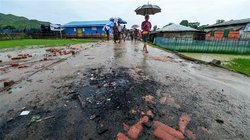 A new report by a United Nations Fact-Finding Mission (FFM) says that persecution against Rohingya Muslims continues in Myanmar, exposing hundreds of thousands of them to the risk of genocide.
A new report by a United Nations Fact-Finding Mission (FFM) says that persecution against Rohingya Muslims continues in Myanmar, exposing hundreds of thousands of them to the risk of genocide. RNA - Thousands of Rohingya Muslims were killed, injured, arbitrarily arrested, or raped by Myanmarese soldiers and Buddhist mobs mainly between November 2016 and August 2017. More than 730,000 Rohingya Muslims fled Myanmar’s Rakhine State to neighboring Bangladesh following an escalated crackdown in 2017 that the UN has said was perpetrated with “genocidal intent.”
The UN’s independent international fact-finding mission on Myanmar presented its final report on the country to the UN Human Rights Council in Geneva on Tuesday.
‘Let me clear: Persecution continues’
“We conclude that there is a strong influence of continued genocidal intent on the part of the state in relation to the Rohingya, that there is a serious risk of genocide recurring,” Marzuki Darusman, the chairperson of the FFM, said.
“Let me be clear: the policies, laws, individuals and intuitions that led the ground work for the brutal clearance operation in 2016 and 2017 remain in place and strong. Impunity continues, discrimination continues, hate speech continues, persecution continues.”
Citing the current circumstances, the mission found that the return of the Rohingya refugees — who now number at about one million — to Rakhine is “simply impossible.”
The report said that the 600,000 Rohingya remaining in Rakhine are living in “deplorable” conditions.
‘Myanmar government still in denial’
The mission said the government of Myanmar “seems unconcerned” by the country’s catastrophic human rights situation.
“Myanmar continues its state of denial. It has declined all dialogue with us and this is deeply regrettable. It shows a lack of good faith towards human rights mechanism, including this mission.”
Myanmar’s de facto leader, Aung San Suu Kyi, a Nobel “Peace” Laureate, rejected the fact-finding mission when it was established by the UN’s rights council in March 2017.
Addressing the council, Myanmar’s Ambassador Kyaw Moe Tun reiterated his government’s rejection of the mission, saying the FFM suffered from what he called a “lack of thorough understanding of our history, our culture, our living style and our languages.”
The fact-finding mission reiterated its call for the prosecution of top generals, including army chief Min Aung Hlaing.
Chris Sidoti, a member of the mission, said at a press conference following the presentation of the report that Myanmar’s civilian government was also responsible for the human rights violations.
The UN panel said it had passed the evidence it gathered from nearly 1,300 interviews with witnesses to a new investigative mechanism for Myanmar, which will support any future prosecution in international courts.
847/940